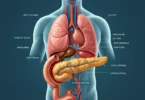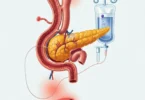Colorectal cancer is also known as Bowel cancer or colon cancer or rectum cancer. Colorectal cancer can generally arise in any part of the intestine: in the small intestine, in the colon or in the anal area. Tumors in the small intestine or in the anal area come much rarer than tumors in the colon, they are also treated differently.
Malignant tumors mainly develop from cells of the intestinal mucosa. Depending on which portion of the colon is affected by cancer, doctors distinguish between
- Rectal cancer and
- Colon cancer.
When the tumor is located in the last section of the colon, than it is called the rectum cancer. If cancer is located in higher sections of intestine than it is known as colon cancer. Rectal cancer and colon cancer are also combined under the term colorectal cancer .
The cancer develops very slowly and is usually not noticed until the late stage due to lack of symptoms. It arises primarily from polyps (adenomas) that degenerate into malignant tumor tissue. Polyps are benign growths that can be removed during a colonoscopy (colonoscopy).
Frequency of Colon Cancer
Colorectal cancer is the second most common cancer. Colon cancer is rare before the age of 40 but in old age the risk of disease is increases, 90 percent of those affected are 55 years old or older. On average a woman is 75 years and a man is 71 old years at time of diagnosis.
Colon cancer is one of the most common cancers in the Western industrialized countries. It isthe third most common cancer of men (after prostate and lung cancer) and the second most common cancer of women (after breast cancer). Approximately two thirds of the diseases are located in the large intestine (colon), while the remainder occur in rectum (rectal cancer). The small intestine is affected in less than five percent of cases of colorectal cancer…………………
Colorectal cancer stages
Colon cancer Causes
Colon cancer Symptoms
Colon Cancer Diagnosis
Colon cancer Treatments






